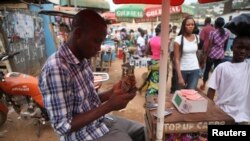The technology-based fact-checking initiative known as iVerify, established by the Sierra Leone Association of Journalists and the Independent Radio Network with support from the United Nations Development Program and BBC Media Action, seeks to mitigate false information threats before, during and after the vote.
Marian Bangura, an iVerify fact checker, told VOA the information is analyzed through various methods to verify its veracity.
"We use some of our software that has been already programmed which will take us directly to the platform. We have the tools that one will check for photos— because we see people going about doing this Photoshop. So we have tools that we use that can fact-check and screen the photos (to determine) if they’re actually real or fake. At the end of it all, we have our true source with regards to photos and even messages, and sometimes videos as well," Bangura said.
Bangura says only information that has been thoroughly fact-checked and cross-checked for accuracy is disseminated on their websites, social media platforms and the Independent Radio Network, which is made up of over 50 radio stations in Sierra Leone.
Ahmed Sahid Nasralla, the president of the SLAJ, says fake news, misinformation and hate speech poses a serious challenge for reporters in the country.
"It is hugely undermining the work that we do as professional journalists because now we see a lot of Sierra Leoneans on social media with access to the internet as supposed to the 2018 elections. Part of what they are doing is making people (doubt) the media," he said.
"In as much as social media is posing a challenge, according to the studies that have been done especially by BBC Media, there is a general understanding that there is a lack of trust in social media by the public...who will then look to traditional media to get the (accurate) news and verified information."
Nasralla said Sierra Leone is among the few countries in Africa that use the iVerify platform.










Forum